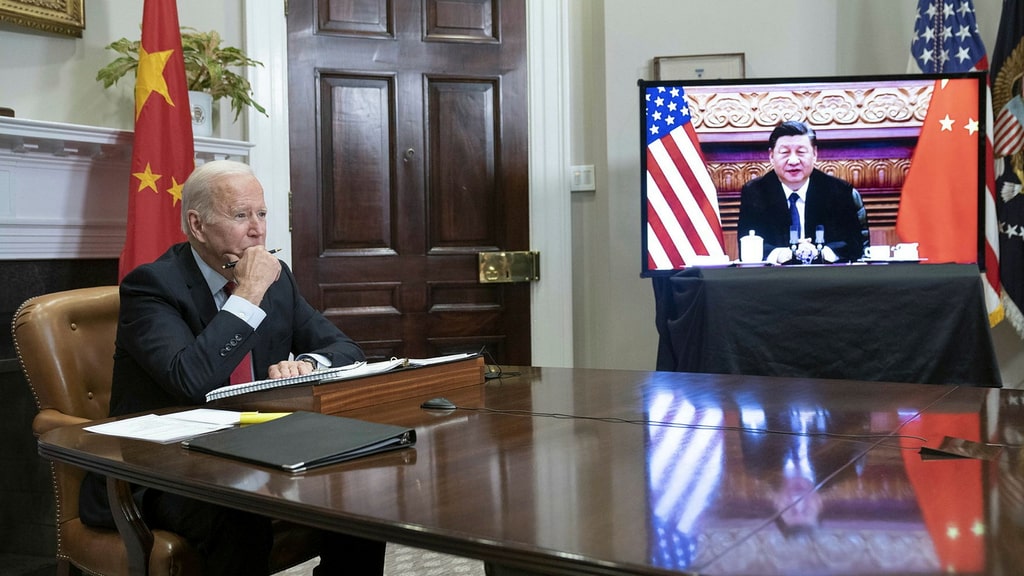After a fall of political crises and plummeting opinion numbers, Joe Biden managed his biggest domestic political victory yet on Tuesday, when he signed off on a landmark $1,200 billion infrastructure investment. It gave him a much-needed boost of confidence ahead of tonight’s important meeting with Chinese President Xi Jinping.
Biden sold the infrastructure package arguing that the United States must make massive investments at home to withstand tougher competition from China in the future.
It could have been humiliating To hold the meeting with Xi tonight if the initiative collapses, one of Biden’s most important campaign promises.
Now a smiling Biden had to start the conversation with what had become the new US mantra for relations with China: “competition without conflict.”
“Our responsibility as leaders of China and the United States is to ensure that competition between our two countries does not lead to conflict,” Biden initially said.
Xi Jinping responded with a warm smile and called Biden his “old friend.” In introductory remarks, Xi stressed the importance of the United States and China “strengthening their communication and cooperation” to address a range of common challenges.
For a moment, it was almost imaginable that Biden and Xi liked each other. It was temporarily possible to forget that China and the United States are in an existential struggle over who will lead the world in the twenty-first century.
The meeting also took place shortly after It turns out that the two superpowers do in fact have a reasonably effective diplomatic dialogue on the climate crisis. It was a mutual victory for both countries that they could negotiate joint promises during the climate summit in Glasgow. The increasingly harsh rhetoric between China and the United States during the year raised legitimate concerns that such diplomatic talks about the climate crisis might unravel.
It is difficult to see how Xi and Biden will proceed with the core conflicts between the two countries. The most sensitive issue is the debate over Taiwan. Biden and his diplomats have previously called on China to ease military and economic pressures on Taiwan that escalated during the fall.
During the year, Biden launched a clear strategy to tame China’s influence, by strengthening US diplomatic alliances with China’s neighbors. Among the first things Biden did as president was to revive what’s known as The Quad – a diplomatic collaboration between the four great powers the United States, India, Japan and Australia. The United States has also launched a new military alliance with Britain and Australia, Aukus, which expands the submarine presence in the Pacific region. But this cooperation upset China, which considers it a provocation.
During the meeting with Xi, Biden emphasized the ambition to develop a common framework for action between countries, with diplomatic “firewalls” that would prevent further conflict.
At first, Biden promised to raise human rights during the conversation with Xi, but for China it is always seen as a sign of US arrogance when they try to interfere with what they see as domestic decisions.
This was the third conversation between the two leaders since Biden became president. The fact that the meeting took place at all can be seen as a slight diplomatic advance, after the tone between the two countries worsened during the fall.
But the meeting should also be seen as a sign that the United States recognizes that there is an acute situation when it comes to China.
Last week, US Secretary of State Anthony Blinken spoke with his counterpart in the Chinese government, Wang Yi, specifically to establish the common interest in preventing the situation in Taiwan from escalating.
In the short public segment that opened the world leaders meeting, Xi Jinping was warm and diplomatic.
But just six months ago he delivered deadly criticism to the United States and other countries trying to interfere in China’s internal politics, during a high-profile speech during the centenary celebrations of the Chinese Communist Party. There, Xi said that the Chinese people would “never allow foreign forces to dominate and oppress us” and continued that “anyone with such illusions will have their head smashed” into a “Chinese steel wall”.
It remains to be seen which of these aspects of Xi Jinping Biden will face in the future.

“Unapologetic writer. Bacon enthusiast. Introvert. Evil troublemaker. Friend of animals everywhere.”









More Stories
More than 100 Republicans rule: Trump is unfit | World
Summer in P1 with Margrethe Vestager
Huge asteroid approaching Earth | World